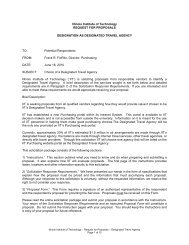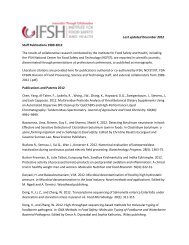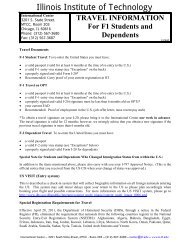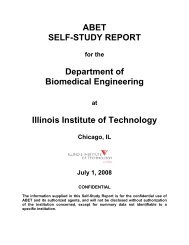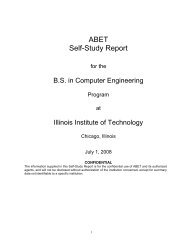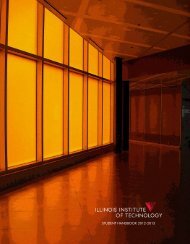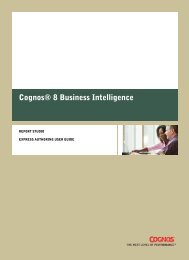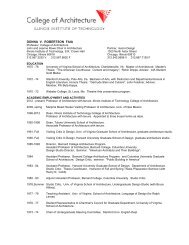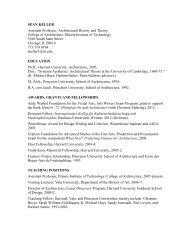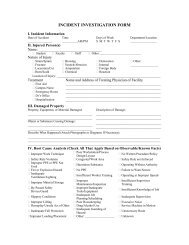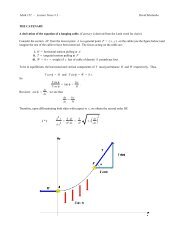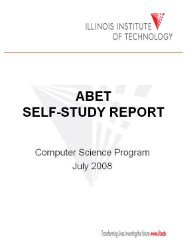Undergraduate Bulletin - Illinois Institute of Technology
Undergraduate Bulletin - Illinois Institute of Technology
Undergraduate Bulletin - Illinois Institute of Technology
Create successful ePaper yourself
Turn your PDF publications into a flip-book with our unique Google optimized e-Paper software.
Course Descriptions<br />
ARCH 462<br />
Planning Law & Land Policy<br />
Since the introduction <strong>of</strong> basic zoning laws to the numbers<br />
and complexity <strong>of</strong> ordinances attached to any land parcel<br />
have proliferated to include those addressing land use,<br />
development, density, environmental concerns both on and <strong>of</strong>f<br />
site, aesthetic mandates, energy use, quality <strong>of</strong> life concerns,<br />
and infrastructure development, the growing understanding<br />
that comprehensive and integrated systems must be managed<br />
across property lines to effect sustainable planning and communities<br />
will accelerate the number <strong>of</strong> prescriptive and policy<br />
ordinances enforced at the development <strong>of</strong> a parcel. Many<br />
agencies have further created extra-legal linkages between<br />
approvals for land development and the provision <strong>of</strong> social<br />
and ideological benefits to the community. The impact on the<br />
pr<strong>of</strong>ession <strong>of</strong> architecture <strong>of</strong> the panoply <strong>of</strong> planning options<br />
and governmental goals is the result that the navigation<br />
<strong>of</strong> the system <strong>of</strong> mandated design determinates is one <strong>of</strong><br />
the initial and potentially most creative acts in the process<br />
<strong>of</strong> project delivery. Project designers must understand the<br />
ramifications and trade-<strong>of</strong>fs inherent in the system, especially<br />
in any attempt to achieve the best use <strong>of</strong> any parcel <strong>of</strong><br />
land and position the most appropriate built environment.<br />
<strong>Undergraduate</strong> students must be in their fifth year <strong>of</strong> study.<br />
Only for 5th year Architecture majors.<br />
(3-0-3)<br />
ARCH 463<br />
Introduction to Real Estate Finance Fundamentals<br />
The Art <strong>of</strong> the Deal, with the emphasis on Art, is a term best<br />
positioning the financial structuring behind any project. The<br />
ability <strong>of</strong> the project team leader in integrated practice to<br />
understand and appreciate the motivations and opportunities<br />
inherent in the initiation <strong>of</strong> the project will be essential<br />
in guiding team decisions and maintaining a leadership<br />
position. The understanding <strong>of</strong> the financial underpinnings<br />
<strong>of</strong> a project is <strong>of</strong> paramount importance to those intending<br />
to actually engage the process <strong>of</strong> initiating and effecting<br />
a construction activity. The sources, costs, and sequence<br />
<strong>of</strong> funding, budgeting, cash flow, incentives options, and<br />
tax ramifications regarding a project are to be addressed<br />
as component knowledge to an understanding <strong>of</strong> integrated<br />
project management. <strong>Undergraduate</strong> students must be in<br />
their fifth year <strong>of</strong> study. Only for 5th year Architecture<br />
majors.<br />
(3-0-3)<br />
ARCH 464<br />
Comprehensive Opportunity Assessment & Entrepreneurship<br />
Development Project/Practicum<br />
Two options are available to the student for the acquisition<br />
and assimilation <strong>of</strong> the breadth <strong>of</strong> knowledge required to bring<br />
project ideas to fruition. The Comprehensive Development<br />
Project is a capstone effort which will demonstrate project<br />
concept, planning resolution, land acquisition strategies,<br />
estimating, scheduling, financial pro-forma, and value capture<br />
intents. The Practicum would entail employment at a vetted<br />
<strong>of</strong>fice engaged in the actual process <strong>of</strong> project assembly. A<br />
position requiring a minimum <strong>of</strong> 20 hours per week, prior<br />
review and approval <strong>of</strong> the work plan, and submittal <strong>of</strong><br />
documentation <strong>of</strong> the work undertaken would be required for<br />
this scenario. The ultimate objective is to provide a roadmap<br />
<strong>of</strong> the interaction between the architect-entrepreneur, market<br />
opportunities, and integrated building delivery practices<br />
which facilitate the development <strong>of</strong> student skills necessary to<br />
compete in a rapidly changing socio-economic environment.<br />
This course is designed to help students learn and use tools<br />
and frameworks to create, implement, and update a strategic<br />
plan to shape the future and guide an entrepreneurial<br />
organization on its path to success. This course will entail<br />
collaboration with real world organizations including<br />
city agencies, community development corporations, IIT<br />
Department <strong>of</strong> Community Affairs, or private developers.<br />
<strong>Undergraduate</strong> students must be in their fifth year <strong>of</strong> study.<br />
Only for 5th year Architecture majors.<br />
(6-0-6)<br />
ARCH 465<br />
Construction & Project Management<br />
The organization <strong>of</strong> deliverables from the multiple participants<br />
in a project plan, including estimating, quality control,<br />
value engineering, scheduling <strong>of</strong> work, conflict resolution,<br />
pay schedules, and project close-out and commissioning are<br />
essential to managing a building project. Many <strong>of</strong> these<br />
areas <strong>of</strong> endeavor are those most directly impacted by the<br />
developments addressed in Integrated Building Delivery<br />
Practice. This course will solidify the underpinnings and will<br />
amplify, where needed, the requisite understanding in these<br />
areas <strong>of</strong> the practice. The development <strong>of</strong> managerial skills<br />
requisite to the practice <strong>of</strong> this coordination and the basis<br />
<strong>of</strong> developing inter-pr<strong>of</strong>essional relationships will be stressed<br />
throughout the incorporation <strong>of</strong> the technical methodologies.<br />
(3-0-3)<br />
ARCH 466<br />
Entrepreneurial Design: Sector Studies/Case Studies<br />
This course will be advanced as an independent study<br />
format. Each student will work independently to research a<br />
project option, or building type, and document the particular<br />
attributes <strong>of</strong> that case study which require specialized<br />
address. Case studies might be a particular business niche<br />
such as land sub-divisions, condo conversions, change <strong>of</strong><br />
use conversions, or build-to-suit options. The studies might<br />
pursue particular building types, social initiatives, historic<br />
restoration strategies, or even unique construction typologies.<br />
<strong>Undergraduate</strong> students must be in their fifth year <strong>of</strong> study.<br />
Only for 5th year Architecture majors.<br />
(3-0-3)<br />
ARCH 467<br />
Advanced Materials Workshop<br />
This course is designed to involve students with the architectural<br />
craft <strong>of</strong> materials that can be applied to model and<br />
prototype construction. Included will be a product project <strong>of</strong><br />
the student’s own choosing.<br />
(1-4-3)<br />
185



